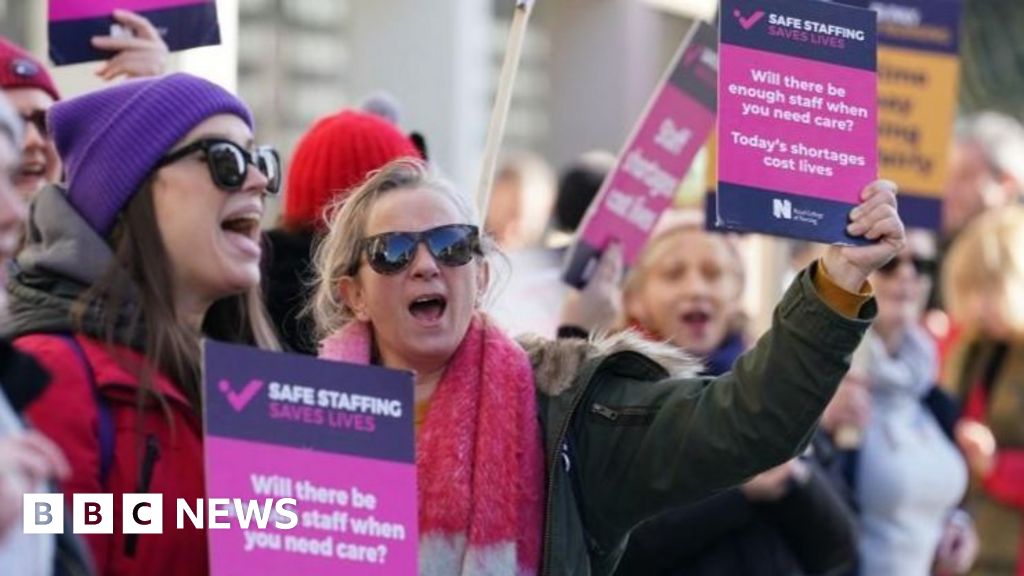ARTICLE AD BOX
Pain hyperacusis: 'It's completely erased me'
By Katie Walderman & Monica Rimmer
BBC North West Tonight
For the last 18 months Karen Cook has been living with an ever-worsening and rare health condition in which everyday sounds cause her crippling and debilitating pain.
"Something as beautiful as my children's laughter, hearing their voices - is like torture for me," she told BBC North West.
The 49-year-old has pain hyperacusis, a condition which means she is often forced to shut herself away from her husband and young sons.
"Sound is everywhere - it's like air, you can't escape it," said Karen, from Southport, Merseyside.
Noises like the wind rustling leaves in trees, or traffic driving past her house can cause Karen immense pain.
Warning: Some readers may find parts of this article distressing
The condition is so severe that, on Christmas Day, she had to sit in another room and watch while her boys, aged seven and 11, excitedly unwrapped their presents.
Karen has not been able to find any cure or even treatment to ease the pain caused by hyperacusis, which is accompanied by the far more common and widely known tinnitus.
She said the hyperacusis developed relatively suddenly in 2022 and had gradually become worse.
While it can be brought on by sound trauma, research suggests some people may be predisposed to suffering from it.
What is hyperacusis and how does it differ from tinnitus?
There are different types of hyperacusis that vary in severity.
The NHS website says "you may have hyperacusis if some everyday sounds seem much louder than they should. It can sometimes be painful.
"You may be affected by sounds like jingling coins; a barking dog; a car engine; someone chewing; a vacuum cleaner."
Tinnitus is the name for hearing noises that do not come from an outside source.
Karen now wears ear plugs and ear defenders even when she's at home alone, and her only way to communicate is through whispers or written notes.
"My house is a prison," she said. "Sound keeps me prisoner."
Describing the pain, Karen said: "It's like somebody poured burning lava into my ears and my head burns, pain all over my head, especially behind my eyes.
"It's like a migraine kind of pain - it's like you want to split your head open to relieve the pressure."
When asked what impact the condition has had on her life, fighting back tears, she said it had been "devastating".
"I miss being a mum, I miss the clatter of the noise when they come in from school.
"I miss just life, I sat and watched them through the window opening their Christmas presents, because it was too loud for me to be in the room and they'd come up to the window and show me.
"It's completely erased me."
Image source, Karen Cook
Image caption,Karen's husband Nick says he is losing his "best friend"
Karen said she was missing out on so many parts of life that most people take for granted.
"I miss listening to music, watching TV or a film with sound, chatting to my friends on the phone," she explained.
"I miss wearing nice clothes and make-up, going for a night out with my husband Nick."
Karen said she used to be "very active" and loved going on camping and skiing holidays.
"I was always on the go," she said. "My life literally stopped so abruptly."
Nick said he was losing his "best friend" of more than 20 years.
"Life was an adventure," he said. "We'd have no plans, we'd just go out for the day and wherever we ended up it was fantastic. Travelling of any description - we bought a caravan in Covid - as well as hiking, football matches, any excuse to get out and about."
He added "everything" they had known as a family had changed.
Image source, Karen Cook
Image caption,Karen says she is "determined" to find treatment
Karen used to work as an airline crew member for 25 years, a career which she said "wasn't just a job it was part of my identity and independence".
It was also where she met Nick.
So much of their life has changed beyond recognition.
"It is literally Groundhog Day," said Karen. "Every day is the same.
"Honestly if I didn't have children I'd have given up.
"But we're going to try and fight and find someone - anyone - who might be able to help."
Ken Devore said events like weddings, travel, movies and music gigs can be very challenging for him
Ken Devore has lived with the condition for 30 years and said some people can improve over time.
Mr Devore, who is a board member of the US charity Hyperacusis Research., added: "There really is no treatment.
"For me, time, quiet environments and just avoiding loud noise is the key to managing it and not making it worse."
For some patients, the NHS advises reintroducing sounds like white noise, which can help build up tolerance levels.
That has not worked for Karen, however.
She has also tried various medications and holistic therapies, but nothing has helped.
Nonetheless Karen said she was "determined" to find treatment for the sake of her boys, who tell people about their mum's "poorly ears".
"One day there might be a cure for this and I've promised myself I will try everything and anything."
If you're affected by the issues in this piece, you can find support from BBC Action Line
Why not follow BBC North West on Facebook, X and Instagram? You can also send story ideas to northwest.newsonline@bbc.co.uk
Related Internet Links
The BBC is not responsible for the content of external sites.

 1 year ago
41
1 year ago
41








 English (US) ·
English (US) ·